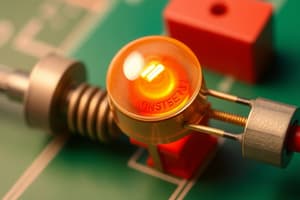Podcast
Questions and Answers
What is the relationship between current and voltage according to Ohm's Law?
What is the relationship between current and voltage according to Ohm's Law?
- They are unrelated
- Voltage causes current
- They are inversely proportional
- They are directly proportional (correct)
In the context of electricity, what does voltage measure?
In the context of electricity, what does voltage measure?
- Resistance in a circuit
- The speed of current
- The flow of electrons
- Potential difference between points (correct)
What is the SI unit used to measure electric current?
What is the SI unit used to measure electric current?
- Watts
- Amperes (correct)
- Volts
- Joules
How is resistance denoted in Ohm's Law?
How is resistance denoted in Ohm's Law?
What does current refer to in the context of electricity?
What does current refer to in the context of electricity?
How does Ohm's Law help engineers in working with electrical systems?
How does Ohm's Law help engineers in working with electrical systems?
What is the relationship between current and resistance?
What is the relationship between current and resistance?
What determines the level of resistance in a conductor?
What determines the level of resistance in a conductor?
What is the main purpose of an electric circuit?
What is the main purpose of an electric circuit?
How does lower resistance impact electric current flow?
How does lower resistance impact electric current flow?
What role do conductors play in an electric circuit?
What role do conductors play in an electric circuit?
How do understanding Ohm's Law, voltage, current, and resistance help in electrical networks?
How do understanding Ohm's Law, voltage, current, and resistance help in electrical networks?
Flashcards
Electricity
Electricity
The flow of electrons from one place to another through conductive materials.
Ohm's Law
Ohm's Law
The relationship between voltage, current, and resistance in an electrical circuit: V = IR.
Voltage
Voltage
The 'push' that causes electrons to flow in a circuit, measured in volts.
Current
Current
Signup and view all the flashcards
Resistance
Resistance
Signup and view all the flashcards
Electric Circuit
Electric Circuit
Signup and view all the flashcards
V
V
Signup and view all the flashcards
I
I
Signup and view all the flashcards
R
R
Signup and view all the flashcards
Electromotive Force (EMF)
Electromotive Force (EMF)
Signup and view all the flashcards
André-Marie Ampère
André-Marie Ampère
Signup and view all the flashcards
Load
Load
Signup and view all the flashcards
Study Notes
Electrical Principles
Electricity is the flow of electrons from one place to another through conductive materials. It powers our world, from lighting streets and powering homes to fueling devices like computers and smartphones. In this article, we will delve into the fundamental concepts of electricity, specifically focusing on Ohm's Law, voltage, current, resistance, and electric circuits.
Ohm's Law
Ohm's Law states that the current through a conductor between two points is directly proportional to the voltage across the two points, assuming constant temperature and pressure. Mathematically, Ohm's Law is expressed as V = IR, where V is the voltage, I is the current, and R is the resistance. This simple equation provides a fundamental understanding of electric circuits, allowing engineers to predict and control the behavior of electrical systems.
Voltage
Voltage, or electromotive force (EMF), is the driving force behind electricity flow. It measures the potential difference between any two points in an electronic circuit. In simpler terms, voltage is the pressure that pushes electrons along a wire, much like water flowing through a hose.
Current
Electric current refers to the movement of electrons through a conducting material. Current is measured in units called amperes, or amps. Ampere is named after André-Marie Ampère, a French scientist who studied electromagnetism. Current is the flow rate of electrical charge—the faster the flow, the higher the current.
Resistance
Resistance is the opposition that a conductor offers to the flow of electric current. It depends on the type of material being used, its temperature, and the physical length and cross-sectional area of the conductor. Lower resistance means less opposition to the flow of electric current, while higher resistance means there is more opposition.
Electric Circuits
An electric circuit is a closed pathway consisting of components such as conductors, switches, batteries, and appliances connected together. The main purpose of a circuit is to provide a path for electric charges to travel from the source of power (battery or generator) to the load (appliance or light bulb). Understanding the basics of ohms law, voltage, current, resistance, and electric circuits helps us design, troubleshoot, and optimize these electrical networks.
In conclusion, the principles of electricity play a vital role in shaping our world. By understandingohms law, voltage, current, resistance, and electric circuits, we can design efficient systems that power our lives. These fundamental concepts serve as the foundation for further study and application in various fields such as electronics, power systems, and electrical engineering.
Studying That Suits You
Use AI to generate personalized quizzes and flashcards to suit your learning preferences.




